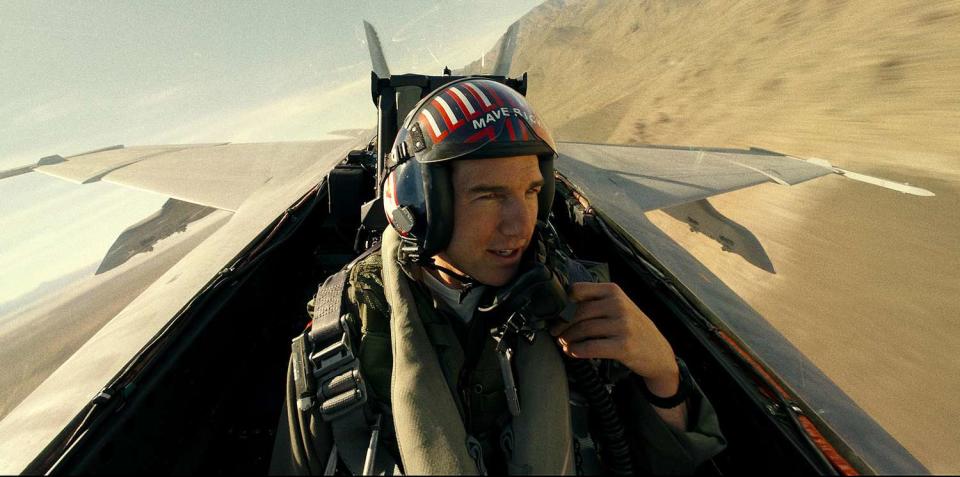Top Gun: Maverick studio files motion to dismiss copyright lawsuit against it
Forget the danger zone — it looks like Maverick and Rooster may soon be headed for the courthouse.
On Friday, Paramount Pictures filed a motion to dismiss a June lawsuit that alleges Top Gun: Maverick infringes on the copyright of the 1983 magazine article that inspired the original film.
The complaint was brought forth by the late writer Ehud Yonay's widow and son, Shosh and Yuval Yonay, who claim the company failed to reacquire rights to the article before the release of the hit sequel. They are seeking damages as well as an injunction on the film's $1.4 billion profits.
Paramount previously secured the film rights to Yonay's article when it released the original Top Gun back in 1986. However, after Yonay's death in 2012, his widow and son terminated the company's copyright to the work in 2018.
In its recent filing, which was obtained and shared in full by Variety, Paramount explains that the family's lawsuit "fails to allege adequately" that Yonay's work "is substantially similar in protectable expression to Paramount Pictures' Top Gun: Maverick."

Paramount Pictures Tom Cruise in 'Top Gun: Maverick'
"To the contrary, any similarity between these vastly different works derives from the fact that Top Gun is an actual naval training facility," the document reads. "Plaintiffs do not have a monopoly over works about Top Gun."
The motion then details the numerous ways that Paramount claims Yonay's original article and the film are different from one another, including the plot, dialogue, themes, setting, pace, and mood. The company also claims that any similarities between Maverick's characters and the real-life people referenced in Yonay's article could be considered ordinary personality traits for aviators.
"Elite fighter pilots loving to fly, and being dedicated to their craft and competitive, are facts described in the Article," the document reads. "Plaintiffs do not have a monopoly over these (unremarkable) facts merely because Yonay once reported on them."
It adds, "To establish that Maverick is an infringing derivative work of the Article, Plaintiffs must show that the two works are substantially similar, which they cannot do."
When reached for comment, the Yonays' attorney, Marc Toberoff, told EW in a statement: "If Ehud Yonay's story is just a bunch of unprotectable 'facts,' as Paramount now argues, then why did Paramount rush out in 1983 to contractually lock up the exclusive film and other rights under copyright to his story? Yonay is credited on the derivative 1986 film Top Gun, much of which is incorporated in its sequel, Top Gun: Maverick. Tellingly, the sequel's ringing of a brass bar bell when the beer is on you is nowhere to be found in the 1986 film. Take a guess where that endearing scene originally comes from. You guessed it: Yonay's story."
"These claims are entirely without merit, and we will continue to vigorously defend this lawsuit," a Paramount spokesperson told EW in a statement.
A hearing for the case will be held Sept. 26.
Sign up for Entertainment Weekly's free daily newsletter to get breaking TV news, exclusive first looks, recaps, reviews, interviews with your favorite stars, and more.
Related content:
Top Gun: Maverick hit with copyright lawsuit amid box office success
Watch us fly Top Gun: Maverick stunt plane, survive the Goose death move, and barf
Jerry Bruckheimer breaks down why Top Gun: Maverick became Tom Cruise's highest-grossing movie
Ready for takeoff! We drank 3 rounds with the hotshot cast of Top Gun: Maverick
The behind-the-scenes story of shooting those crazy Top Gun: Maverick flying sequences
Why Top Gun: Maverick starts exactly the same way as the original film

